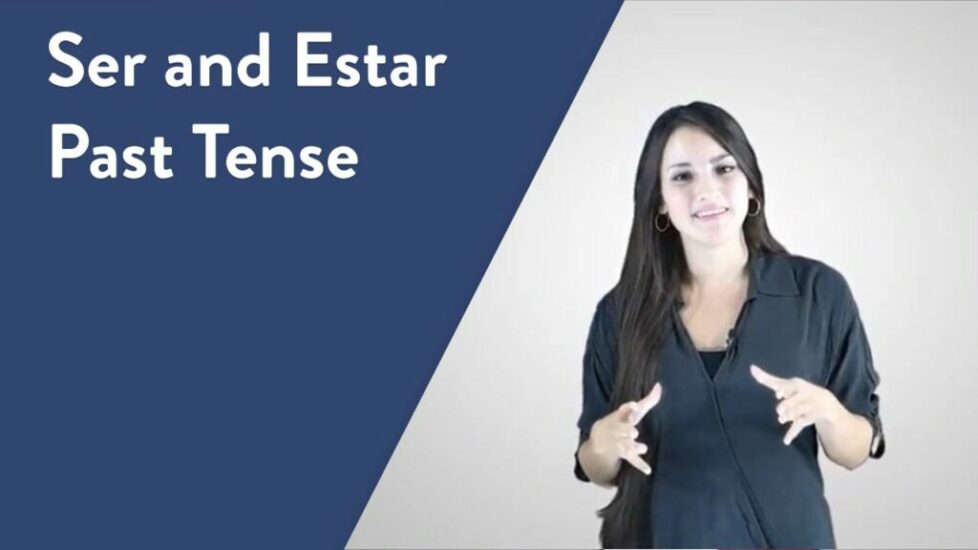Ser vs. Estar Past Tense

Go to the bottom of the page for worksheets to practice this skill.
When using “ser” and “estar” in the past tense the same basic rules apply, but you need to think about if the situation calls for the “preterit” or the “imperfect”. The previous lesson goes into the differences between these two verb tenses. Basically the imperfect tense is used for talking about something that was on going in the past and the preterit is used for talking about a past event that has a clear starting and ending point. The following is a chart to show the conjugations for “ser” and “estar” in the past tenses and examples of when to use them.
ESTAR (preterit)
(Yo) Estuve – I was
(Tú) Estuviste – You are
(Él/Ella/Usted) Estuvo – He/ She/ It was
(Nosotros/as) Estuvimos – We were
(Ellos/Ellas/Ustedes) Estuvieron- They/ All of you (plural) were
Like I mentioned before, you are still using the same rules of when to use “ser” and “estar”. Now you just need to think about how that may work in the past tense. The following are examples of sentences that would need “estar” in the preterit:
“Juan no estuvo en clase ayer.” (Juan wasn’t in class yesterday.)
“Estar” is used because we are talking about location. The preterit is used because we have a defined timeline of when he wasn’t in class. The situation wasn’t on going. It was just happening yesterday.
“Los chicos estuvieron enfermos el sábado pasado.” (The boys were sick last Saturday.)
This time we know we have to use “estar” because we are talking about a condition. We know that the verb needs to be in the preterit because there is a defined time line of when they were sick. They were sick on Saturday and then we assume they got over it. If we said, “los chicos estaban enfermos.” we would assume that the sickness was ongoing. So if you want to imply that the sickness happened and then it was over you would use the preterit.
ESTAR (imperfect)
(Yo) Estaba – I was
(Tú) Estabas – You were
(Él/Ella/Usted) Estaba – He/ She/ It was
(Nosotros/as) Estábamos – We were
(Ellos/Ellas/Ustedes) Estaban – They/ All of you (plural) were
We know that you use the imperfect to convey that an action was on going. The start and end of the action is not fixed. Again, the same basic rules for “estar” are used. The following are two examples of when to use “estar” in the imperfect tense.
“Yo estaba hablando por teléfono.” (I was talking (on going) on the telephone.)
This is an action that was ongoing and does not specify when it started or when it ended. “Estar” is used because the speaker is talking about what they were doing at that moment.
“Ella estaba contenta con la situación.” (She was happy with the situation.)
“Estar” is used because we are talking about a condition. The imperfect is used because the speaker isn’t specifying the starting and ending points of the condition.
SER (preterit)
(Yo) Fui – I was (Tú) Fuiste – You were (Él/Ella/Usted) Fue – He/ She/ It was (Nosotros/as) Fuimos – We were (Ellos/Ellas/Ustedes) Fueron- They/ All of you (plural) were
We use the regular conditions for “ser” in deciding whether or not to use this verb, but we must think about if the situation is on going (imperfect) or if it has a defined starting and ending point (preterit). Here are two examples of “ser” being used in the preterit and an explanation on why.
Yo fui el primero en llegar. (I was the first to arrive.)
We use preterit because the act of arriving is not on going. If you said, “Yo era el primero en llegar.” then you would be saying “I used to always be the first to arrive.” We use “ser” instead of “estar” because we are identifying who it was that arrived.
El dinero fue para Marcos. (The money was for Marcos.)
We use “ser” because we are talking about “to be” with “para” to express what something was intended for. We use the preterit because we are trying to convey that the situation was not on going. There was a start and a finish to the action.
SER (imperfect)
(Yo) Era – I was
(Tú) Eras – You were
(Él/Ella/Usted) Era – He/ She/ It was
(Nosotros/as) Éramos – We were
(Ellos/Ellas/Ustedes) Eran- They/ All of you (plural) were
We use “ser” in the imperfect to express “was/were” in an on going sense. Here are some examples:
Mi padre era de México. (My dad was from Mexico.)
We use “ser” because when you talk about nationality “ser” is used. The imperfect is used because you do not want to express a specific starting and ending point.
Yo era doctor. (I was a doctor.)
In this case, because we use the imperfect, we are implying that I was always a doctor. There is not a focus on when I was a doctor and when I stopped being a doctor. The on going situation was that I was a doctor. If I had said, “Yo fui doctor.” then I would be implying that I was a doctor, but it was temporary (ending point). “Ser” is used because we are identifying a person.
